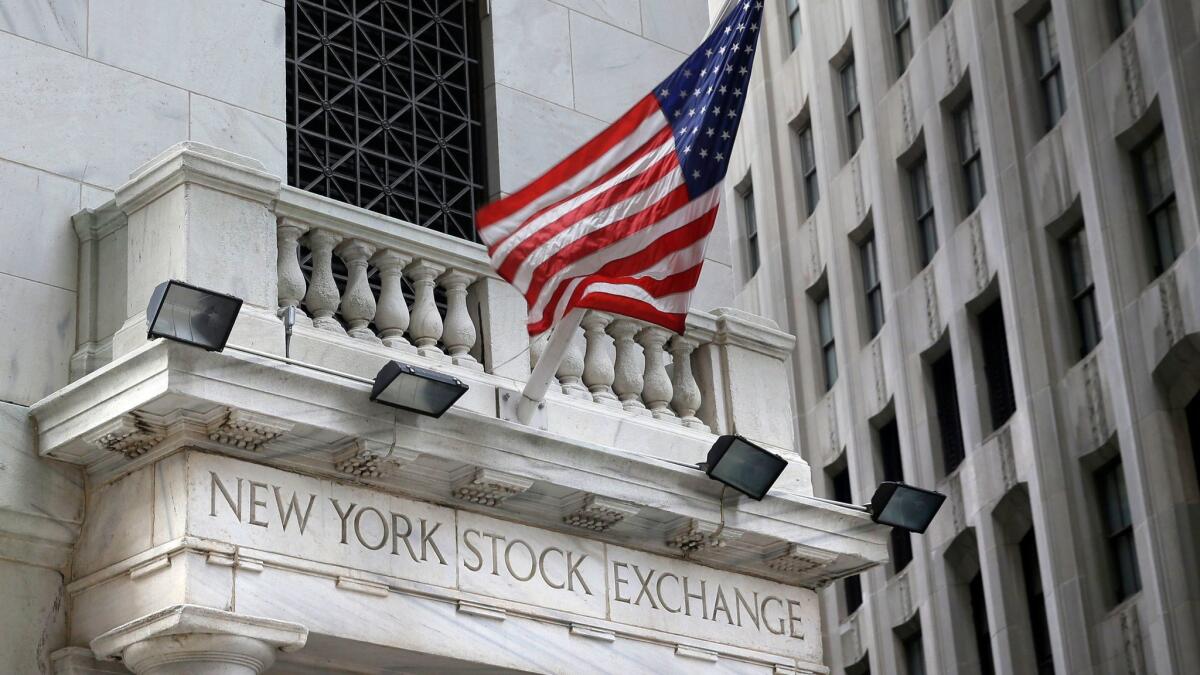Stock indexes power to more record highs

- Share via
U.S. stocks powered to their biggest gain in almost nine months Friday as drugmakers and technology companies surged. Investors were cheered that President Trump appeared to take a more positive tone on international trade.
AbbVie boosted biotechnology companies with a strong fourth quarter and a greater annual profit forecast, and Pfizer and other drugmakers also made big gains. Intel had its best day in almost nine years after its fourth-quarter results reassured investors that security flaws recently discovered in its processors aren’t damaging its sales. Wynn Resorts tumbled following sexual misconduct allegations against Steve Wynn, the casino operator’s chairman, CEO and biggest shareholder.
Speaking at the World Economic Forum in Davos, Switzerland, Trump said Friday that leaders should prioritize their own countries, but that his administration isn’t opposed to international cooperation and that continued growth for the U.S. economy is good for the rest of the world.
“He did talk about making sure trade deals are fair, but I just thought it was a completely different tone today,” said JJ Kinahan, chief investment strategist for TD Ameritrade. “I think the market really took a lot of positives away from that.”
On Wednesday and Thursday, comments from Trump as well as Treasury Secretary Steven T. Mnuchin and Commerce Secretary Wilbur Ross contributed to swings in stock prices and the dollar as investors tried to parse the remarks for indications of the administration’s stances on the dollar and international trade.
The Commerce Department said the U.S. economy grew 2.6% in the fourth quarter. That was a bit less than analysts predicted but still a solid result.
The Standard & Poor’s 500 index climbed 33.62 points, or 1.2%, to 2,872.87, its biggest gain since March 1. The Dow Jones industrial average advanced 223.92 points, or 0.8%, to 26,616.71. The Nasdaq composite jumped 94.61 points, or 1.3%, to 7,505.77. The Russell 2000 index of smaller-company stocks rose 6.39 points, or 0.4%, to 1,608.06.
Already at record highs, the S&P 500 is up 7.5% in January and on track for its largest monthly increase since October 2015.
Technology and industrial companies made hefty gains, as did Amazon and other retailers, and banks rose along with interest rates. Those companies tend to benefit from more global trade and faster economic growth. Many of them are helped by a weaker dollar, and the U.S. currency declined again Friday. The weaker dollar raises costs for more U.S.-focused companies such as those in the Russell 2000, which lagged behind other major indexes Friday.
Intel said that its data center business did well in the fourth quarter and that the “Meltdown” and “Spectre” security flaws aren’t affecting its sales. It forecast $65 billion in revenue this year, more than analysts expected. The stock jumped 10.6% to $50.08, its biggest gain since March 2009.
Tech firms have led the market’s big gains since the start of 2017, and that will be put to the test next week as a slew of major companies including Apple, Microsoft, Facebook and Alphabet, Google’s parent company, report their quarterly results.
AbbVie posted greater sales of key drugs including Humira, an inflammatory disease treatment that is the world’s biggest-selling drug by revenue, and its hepatitis C treatments. AbbVie also raised its profit forecast for 2018. The stock jumped 13.8% to $123.21.
Pfizer rose 5.3% to $39.01 on reports that it’s getting closer to a deal to sell its consumer healthcare business, a possibility Pfizer raised in October.
Wynn Resorts plunged 10.1% to $180.29 after the Wall Street Journal reported on dozens of allegations against Wynn, who denied any wrongdoing.
Starbucks slid 4.2% to $57.99 after it posted weaker growth than investors had hoped. Analysts were unhappy with its results outside the U.S., and Starbucks also said holiday merchandise sales were slow.
The dollar declined further against other currencies, falling to 108.66 yen from 109.41 yen. The euro rose to $1.2423 from $1.2391. The ICE US dollar index is at three-year lows and has declined for six consecutive weeks.
Bond prices fell. The yield on the 10-year Treasury note rose to 2.66%, matching its highest level in more than three years, from 2.62%.
After it reached an 18-month high Thursday, gold fell $10.80 to $1,352.10 an ounce. Silver dropped 17 cents, or 1%, to $17.44 an ounce. Copper fell 2 cents to $3.20 a pound.
Benchmark U.S. crude rose 63 cents, or 1%, to $66.14 a barrel in New York. Brent crude, used to price international oils, rose 10 cents to $70.52 a barrel in London.
Wholesale gasoline rose 2 cents to $1.94 a gallon. Heating oil rose 2 cents to $2.14 a gallon. Natural gas rose 9 cents, or 2.5%, to $3.53 per 1,000 cubic feet.
In overseas markets, the CAC 40 in France jumped 0.9%, the German DAX gained 0.3%, and the FTSE 100 in Britain rose 0.7%. Japan’s Nikkei 225 slipped 0.2%. South Korea’s Kospi rose 0.5%. Hong Kong’s Hang Seng index jumped 1.5%.
More to Read
Inside the business of entertainment
The Wide Shot brings you news, analysis and insights on everything from streaming wars to production — and what it all means for the future.
You may occasionally receive promotional content from the Los Angeles Times.










